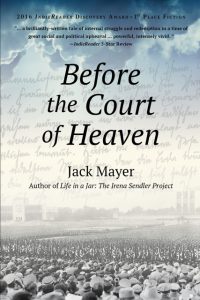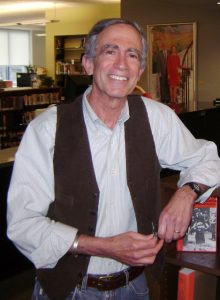Today you’re in for a treat – a review AND some background and insights from the author! I’m pleased to introduce Jack Mayer and his historical fiction, Before the Court of Heaven – a novel based on the true story of a fascist assassin which explores Germany’s transition from the Weimar Republic to the Third Reich.
 The Book
The Book
The novel is based on the true story of a fascist assassin, Ernst Techow, and his complex and harrowing redemption. Techow participates in the 1922 murder of Foreign Minister Walther Rathenau, the highest-ranking Jew in the Weimar Republic. The novel is inspired by the history of how Germany’s Weimar democracy became the Third Reich. Ernst Techow’s history is also the tender story of his inextinguishable passion for his first love, Lisa. The book has won thirteen book awards, and is a cautionary tale on how ordinary people can becomes complicit in extraordinary crimes.
The Review
This is a deeply affecting story. Mayer is a very talented writer, and he really brings the history alive. The flow and pacing are precise and pitch-perfect. The characters are thoughtfully and carefully presented and throughout the development of the novel, the reader gets a very real sense of the personalities behind the history. The turmoil in Germany (and the world) at the end of the First World War is palpable. The role of the post-War punitive treatment of Germany in the rise of extreme German nationalism is articulated in a strong, clear voice. The blend of historical detail and fictional narrative is spot-on. Mayer does a marvelous job encapsulating the thought processes behind the anti-Jewish sentiment and the fall of the democratic Weimar mindset. But this is not only a well-crafted story; it is also, as Mayer himself opines, a cautionary tale for our time. This is a book that deserves a great deal of attention – not only from fiction and history readers, but also from those interested in geopolitics and sociological trends.
My review copy was provided by the author through the coordination of IBPA (Independent Book Publishers Association).
Author Q&A

Your new book, BEFORE THE COURT OF HEAVEN, is historical fiction inspired by the history of how Germany’s Weimar democracy became the Third Reich. You call it a cautionary tale for our time. Why?
George Santayana (1863 – 1952), the Spanish philosopher, essayist, poet and novelist, said, “Those who cannot remember the past are condemned to repeat it.”
Santayana enjoins us to recognize the echoes of painful history and do what we can to prevent its repetition. History is cyclical, but we can never anticipate how recurrence will manifest. It’s never identical. Today, we hear echoes of the history of Germany’s Weimar democracy, which was born after W.W. I and, in only 14 years became the Third Reich – a Nazi dictatorship.
German journalist and New York Times columnist Jochen Bittner, noted this past May (“The West’s Weimar Moment”) that there were 4 conditions that cleared the path for the fall of the Weimar democracy and the rise of the Third Reich –1) loss of trust in institutions, 2) social humiliation, 3) political blunder and 4) economic distress. I would suggest, though not identical, these conditions exist again today. Scholars of history and the Holocaust at Middlebury College and the University of Vermont Center for Holocaust Studies, have vetted the accuracy of my portrayal.
In 1933, Germans in a constitutional democracy with free elections and the rule of law choose Hitler and the Nazis. My hope is that by animating this history as historical fiction, readers will understand it in a visceral way so we don’t repeat it. My fiction explores the capacity inherent in each of us for unspeakable horror and remarkable goodness – our devils and our better angels. BEFORE THE COURT OF HEAVEN is a meld of creative non-fiction and fiction, my created characters helping to flesh out historical persona.
Like Germans between the world wars, we, too, have choices to make.
Where did this story come from? What inspired you to write BEFORE THE COURT OF HEAVEN?
I first heard this story of the redemption of Ernst Techow, a young fascist assassin – an early Nazi – as a Yom Kippur sermon at Middlebury College in 1992. Yom Kippur is the holiest day of the Jewish calendar – a day of atonement – a day to plead before the court of heaven for forgiveness for sins against God, a day to turn from evil and redeem one’s self. But sins against our fellow humans must be confessed and atoned person to person. How does one do that after murdering someone? What does that atonement look like – the redemption that must precede, that must transpire before the court of heaven?
Why is this history important?
A plurality of Germans voted for the Nazi party and Hitler became Chancellor in 1933 through legal parliamentary processes.
It is our unfortunate nature to project evil onto others, as if we are not capable of it ourselves. In considering the history of Nazi Germany, we do so at our peril. The Third Reich rose to power as a malignancy within Germany’s Weimar democracy that followed World War I. Germany, the nation that brought us Bach, Beethoven, Brahms, Goethe, Brecht, Thomas Mann, Schiller – an enlightened society – also brought us Hitler and the Nazis.
By gazing into the imperfect, but compelling mirror of history, we better understand the present. Consider my two epigraphs:
“Art is a lie which makes us realize the truth.” – Picasso
“What are our stories if not the mirrors we hold up to our fears?” – Wally Lamb (This One Thing I Know is True)
BEFORE THE COURT OF HEAVEN spans an epoch in Germany from the early 20th Century, from revolution and unrest after World War I, to the fragile Weimar democracy, the rise of the Nazis, World War II and the Holocaust.
In a time of economic distress, cultural quarrels, and political polarization and gridlock, Germans hoped, and Hitler promised, to “make Germany great again.” Ordinary citizens responded to the appeal of demagogues who used fear, populism, xenophobia, nationalism, bigotry and scapegoating and promised that a law and order, authoritarian ideology would save Germany from its decline at the hands of “the other.”
Hitler’s campaign depended on fear, utilizing inaccurate historical analysis and outright lies to mobilize a vulnerable population. Hitler threatened the judiciary. The Nazis demonized the press and developed a propaganda campaign of savage efficacy.
We hear reverberations of this history today and are reminded to be vigilant for the cyclical return of barbarism.
Tell me about the writing process. How do you mix history with fiction?
At some point, the paths of novelist and historian diverge, but not so sharply as you might think. And one path informs the other.
I felt compelled by this young assassin’s story and I sought primary evidence. I obtained microfilm transcripts from the Library of Congress of Ernst Techow’s arrest, interrogation, and trial. Some were hand-written. My dear friend, Marita Schine, a German, sat with me in Middlebury’s Ilsley Library every Tuesday where, frame by frame, she translated the German.
I read newspaper accounts and scholarly works of the trial and of Weimar Germany, and this history grew larger and more fantastic. Ernst’s trial, the Organization Consul Trial, was actually the trial of 13, mostly young fascists and violent nationalists (early Nazis) who tried to destroy the fledgling Weimar democracy.
The 1922 Organization Consul trial is a window on the tumultuous early years of Germany’s Weimar Republic and reveals the earliest omens and manifestations of Nazism festering within this fragile democracy. My account of the Organization Consul trial is part creative non-fiction rooted in the transcripts. I could not have made up the drama, the twists and turns of these proceedings.
Rathenau’s elderly mother, Mathilde Rathenau attends Ernst’s trial. Before he is sentenced, she asks that her letter to Ernst’s mother be read aloud in court. In the letter she offers Ernst her forgiveness for murdering her son, if “before an earthly judge he make a full and frank confession of his guilt, and before a heavenly one repent.” This actual letter, in my fiction becomes the fulcrum of Ernst’s complex and harrowing redemption.
Three themes informed my writing: 1) How and why did Germans in a constitutional democracy with free elections and the rule of law choose Hitler and the Nazis, 2) unfathomable forgiveness and its consequences, and 3) the complexity of redemption.
BEFORE THE COURT OF HEAVEN tells the stories, real and imagined, of individuals embedded in this history. As a writer I use the particular to focus a larger reality. History has the quality of fractals – similar patterns recurring at progressively smaller scales. We glimpse a larger whole through examination of quotidian details, the ordinary lives we can relate to, that are the sub-atomic particles of history.
Fiction illuminates the truth. I was moved by Rabbi Rothschild’s Yom Kippur sermon. I believe such stories touch something vital and unique in us. They speak to our better angels. Historical fiction animates history so that we understand it and feel it. This story is an immunization against the recurrence of horrors such as Nazism, and inspires us to do our part toward the repair of the world – in Hebrew, Tikkun Olam.
What do you hope BEFORE THE COURT OF HEAVEN will accomplish?
Hitler worked his will legally and took advantage of Weimar’s fatal flaws. He articulated people’s fears, their rage, their humiliation. They had been left behind and betrayed by a ruined economy, a degenerate culture, by women making free choices, by Communists, by Jews, Slavs, Romany, immigrants. He gave voice to their fear of “the other.” He gave credibility to Eugenic theories that reinforced their own biases of Aryan superiority. In exchange, the German people, ordinary people no different than you and me, gave Hitler the reins of a dictatorship that would commit extraordinary crimes.
Rabbi Abraham Joshua Heschel, a civil rights leader, and a progressive Jewish theologian, observed about the Holocaust, “Few are guilty, all are responsible.”
We hear an echo of Weimar today in our political discourse. No one of us can reverse this disturbing reverberation, but each one of us can do something, no matter how small, to promote decency, tolerance and respect for all people.
George Santayana warned us to remember history or repeat it. Some choose to willfully forget, or ignore history. Two thousand years ago, another Hebrew sage, Rabbi Tarfon, said, “It is not for us to finish the task, neither are we free to desist from it.” BEFORE THE COURT OF HEAVEN is one small effort to keep that dark history alive as a cautionary tale for today.
***
For more information about Jack Mayer and his work, visit him online.


 Jill-Elizabeth LinkedIn
Jill-Elizabeth LinkedIn



Leave a Reply